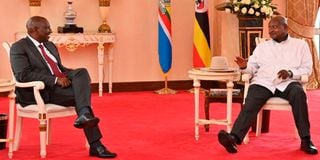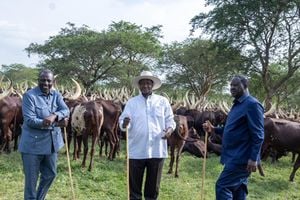
President William Ruto and his Ugandan counterpart Yoweri Museveni at State House Uganda in a past event.
Kenya has barred Uganda National Oil Company (Unoc) from selling fuel to neighbouring countries, in a move to protect the transit market for Kenya Pipeline Company and local oil firms. The licence also bars Unoc from trading in liquified petroleum gas (LPG).
These are part of the conditions in the licence that the Energy and Petroleum Regulatory Authority (Epra) issued to Unoc last week, ending nearly seven months of delays and disputes that had spilled to the regional court.
The permit will allow Unoc to use the storage and transport facilities of KPC to directly import fuel from Vitol Bahrain, ending decades of reliance on local oil firms.
Barring Unoc from selling the fuel outside Uganda will safeguard the transit revenues for KPC and the regional markets of local oil firms in Rwanda, South Sudan, the Democratic Republic of Congo and Burundi.
“The license shall be for the importation and exportation (transit) of refined petroleum products only,” reads the license which will be valid for a year to March 27, 2025. Sources in the industry say that the conditions are meant to protect KPC’s revenues from the transit market, adding that local oil firms can still incorporate branches in Uganda and get supplies from Unoc.
“The conditions are meant to protect KPC given that it is a strategic asset to the government. KPC will retain revenues from the transit market but Kenya can lose corporation taxes if local firms opt to open and incorporate branches in Kampala,” said the source.
Experts also say that Uganda’s move can set the stage for neighbouring countries to opt for a similar arrangement with KPC, dislodging local oil firms from yet another market. Other stringent conditions include tying Unoc to all penalties for violations of the Petroleum Act of 2019, as the Ugandan State company plays under the same rules as local oil firms.
Uganda imports an average of 2.5 billion litres of petroleum annually valued at $2 billion (Sh265.2 billion at current exchange rates), with KPC handling at least 90 per cent of the cargo. Up to 40 per cent of all imported fuel is destined for the transit market, with Uganda taking the biggest share of the cargo.
There are also concerns that Unoc’s deal will disrupt another source of dollars for the government-to-government deal between Kenya and three Gulf oil majors, besides prompting a revision of the monthly import volumes given that Uganda’s fuel will no longer be imported by local oil firms.
Issuance of the license will allow Unoc to start directly importing fuel for Uganda under a deal signed with Vitol Bahrain. Vitol is a Switzerland-based Dutch oil multinational. It partly owns the Fujairah Refinery in the United Arab Emirates (UAE).
Unoc has in recent weeks been selling petroleum products to oil marketing firms in Tanzania and Uganda, albeit in small quantities as it tests the market ahead of rolling out a direct import deal with Vitol Bahrain. The Ugandan government-owned oil firm has over the years been primarily supplying fuel to State-owned entities in the country but is now set to start selling to private OMCs in Kampala.
Uganda had said it would opt for the port of Dar es Salaam to directly import the fuel after Kenya declined to issue Unoc with a local license. But President Yoweri Museveni's administration changed tune and stuck with the port of Mombasa, given that it is cheaper and the fuel handling and storage facilities are of superior quality compared to those at the port of Dar es Salaam.
Epra had rejected the application on grounds that Unoc failed to meet requirements such as ownership of five licensed retail stations and proof of annual sales of 6.6 million litres of fuel.
Unoc had also failed to show proof of annual turnover of $10 million (Sh1.32 billion at current rates) for the last three years and ownership of a licensed petroleum depot in Kenya, even as Kampala held that Kenya was placing unrealistic conditions. Uganda then filed a case at the East African Court of Justice as it sought to compel Nairobi to issue the license and open up KPC’s facilities to Unoc, raising questions on the state of the diplomatic ties between the two countries.
But a visit to Uganda by President William Ruto in February where he held talks with his counterpart, Yoweri Museveni, set the stage for Unoc to get a license.
The case that had been filed at the High Court in Machakos to protest Unoc’s license application last year was withdrawn, days before Epra issued the license. Issuance of the license also signals an end to the court case filed at the regional court in Arusha last year.
However, the two governments have not disclosed whether the case has been withdrawn following Kenya’s move to finally issue the license.







